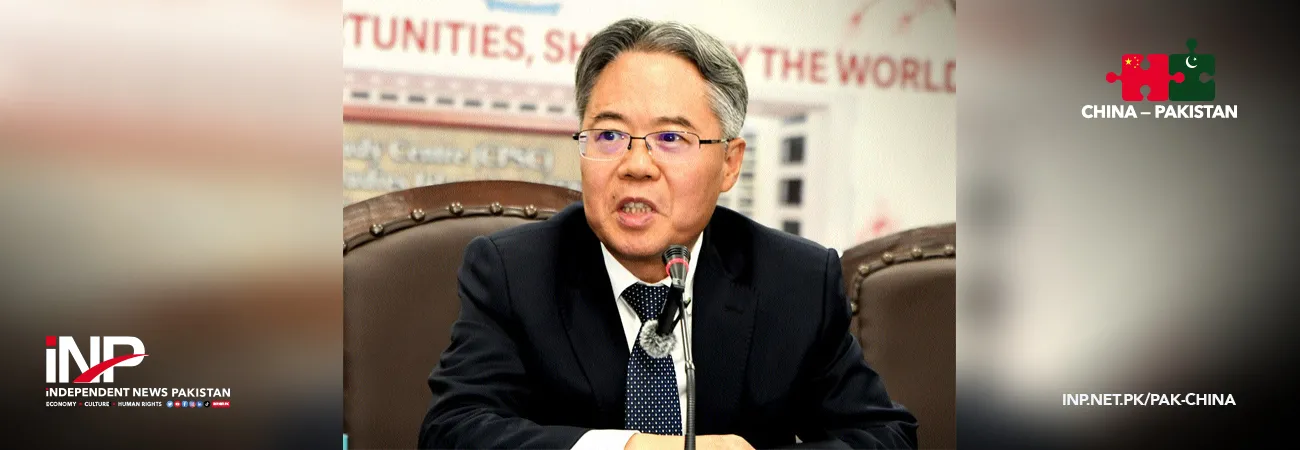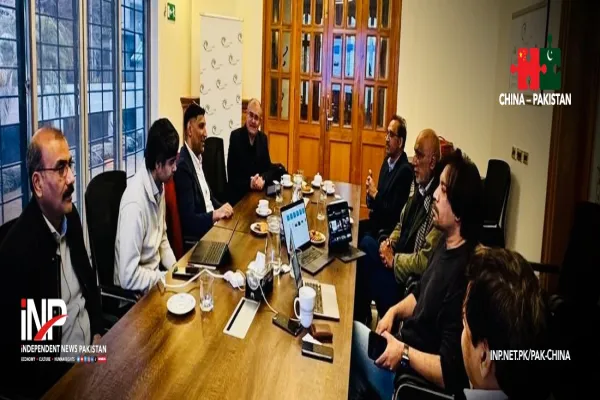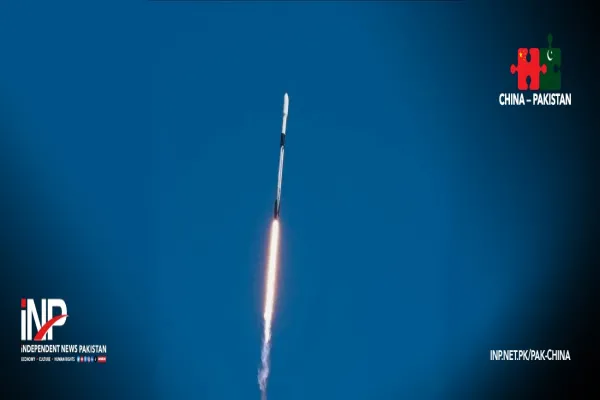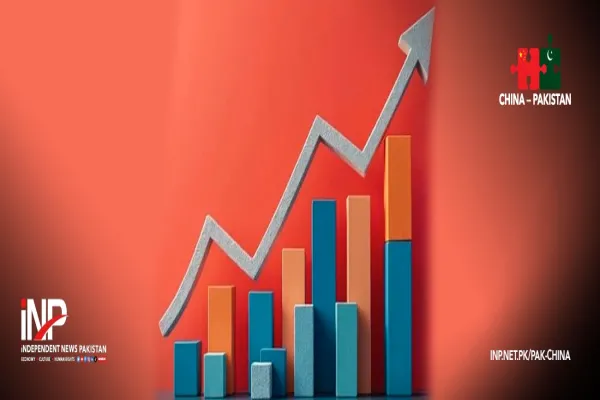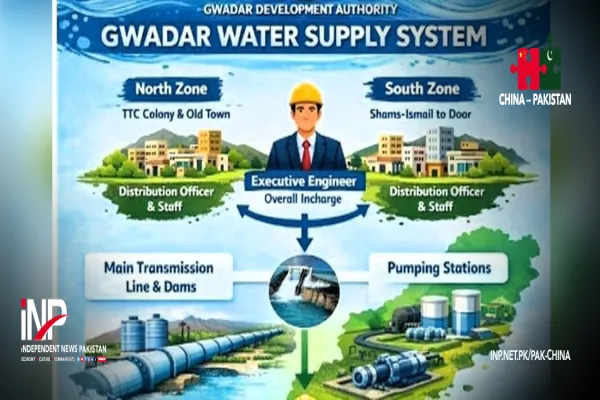i NEWS PAK-CHINA
Pakistan, China leadership have attached great importance to agricultural collaboration, identifying it as a priority in bilateral cooperation. This was stated by Ambassador Jiang Zaidong here on Monday at a distribution ceremony of Chinese Agricultural Equipment and Tools Project at NARC. The ceremony was also addressed by Federal Minister for Food and Agriculture Rana Tanveer Hussain. In this project, China has provided Pakistan with 278 sets of agricultural machinery and equipment worth 30 million yuan (1.16 billion rupee) for free, including tractors, seeders, combine harvesters, and photovoltaic water pump systems and so on.
The Ambassador said, "this represents the largest China aided agricultural equipment project to Pakistan in recent years.
China and Pakistan are both traditionally big agricultural countries. Pakistan boasts 30.5 million hectares of agricultural land, accounting for over 40% of its territory. Three-fifths of its population resides in rural areas, two-fifths of employment comes from agriculture, one-fifth of exports are agricultural products, and one-fourth of GDP originates from the agricultural sector. Pakistan ranks fourth, fifth, eighth, and ninth globally in sugarcane, cotton, wheat, and rice production respectively, with livestock numbers reaching 225 million.
It stands as the world’s fourth-largest leather exporter and fifth-largest milk producer. In 2024, China’s GDP reached 134.9 trillion yuan (USD 18.94 trillion), with agriculture contributing 6.8%. The contribution rate of agricultural sci-tech advances exceeds 63%, overall mechanization rate in crop cultivation, growth and harvest surpasses 75%, and total grain output has exceeded 1.4 trillion jin (700 million tons) for the first time.
These figures demonstrate tremendous potential for China-Pakistan agricultural cooperation. Currently, China-Pakistan agricultural cooperation continues to deepen in four main aspects. First, institutional mechanisms have been strengthened. The China-Pakistan Agricultural Joint Working Group mechanism has been established. Last Tuesday, the fourth JWG meeting was successfully convened in Beijing, following which multiple agricultural cooperation agreements will be signed.
Second, agricultural trade tie has grown closer. Over the past three years, nine new protocols for Pakistani agricultural exports to China have been signed, maintaining bilateral agricultural trade above $1 billion annually, with Pakistan consistently maintaining a trade surplus. In Q1 2024, China-Pakistan agricultural trade reached $228 million, up 21.4% year-on-year. Pakistan’s first exports of heat-treated beef, fresh cherries, and frozen buffalo embryos to China was witnessed last year. And in February this year, the first batch of high-value-added buffalo dairy products arrived in China. Third, personnel exchanges have intensified.
The Chinese government supports numerous Pakistani agricultural professionals to study in China every year. Another 300 young agricultural talents departed for training programs in Yangling, Shaanxi Province, China just last week. Fourth, agricultural-industrial cooperation has been consolidated. Agricultural projects under the China-Pakistan Economic Corridor (CPEC) now comprehensively cover grain, cotton, oil crops, meat, and dairy production.
The implementation of these projects will strengthen Pakistan’s agricultural foundation in all aspects. In June, we will host the High-Quality Development Forum on China-Pakistan Agricultural Cooperation to pool collective efforts for elevating agricultural-industrial collaboration. Looking back, China-Pakistan agricultural cooperation has yielded substantial achievements. I would like to express appreciation to Your Excellency Federal Minister Rana Tanveer Hussain for his active efforts in advancing our cooperation.
I am confident agricultural collaboration between China and Pakistan will maintain high-level momentum and achieve greater development. In today’s world of intertwined transformations and challenges, our agricultural cooperation plays an irreplaceable role in ensuring food security, consolidating development foundations, and jointly addressing external challenges.
As we advance along the path of becoming strong nations in agriculture, I would like to cite a Chinese proverb: “To do a good job, one must first sharpen his/her tools.” Advanced agricultural equipment forms the foundation for agricultural modernization. We hope Pakistan will make optimal use of the agricultural equipment and tools aided by China to maximize benefits for its people.
The United States’ arbitrary imposition of additional tariffs on over 180 countries has severely infringed upon the legitimate rights and interests of all countries, severely undermined the multilateral trading system, and severely disrupted the global economic order. The IMF has already revised down its forecast for 2025 global economic growth from 3.3% to 2.8%. In the face of the U.S.’s new round of extreme pressure tactics, China remains unwavering in focusing on our own affairs and expanding high-standard opening-up. We will counter the uncertainty of drastic changes in the external environment by the certainty of China’s high-quality development. China’s development continues to advance with solid steps.
In the first quarter of this year, China’s gross domestic product (GDP) grew by 5.4% year-on-year, surpassing last year’s overall growth of 5% and the 5.3% growth of Q1 2024. Domestic demand’s contribution to the economic growth increased by 6.3 percentage points compared to the fourth quarter of last year, while the value added of high-tech manufacturing rose by 9.7% year-on-year.
China and the world continue to move toward each other. Despite headwinds, China’s foreign trade in Q1 2025 grew by 6.9% year-on-year, total goods imports and exports increased by 1.3%, over 170 countries and regions saw positive growth in imports from China, and the recent Canton Fair attracted 148,000 overseas buyers from more than 200 countries and regions, a 20% increase year-on-year. Faced with U.S. bullying and hegemonic actions, China has stood as a shelter against the the storm for developing nations.
China’s resolute countermeasures not only defended our own legitimate rights but also upheld international rules, order, equity, and justice, gaining wide support from the international community. Last Thursday, China initiated an informal UN Security Council meeting themed “The Impact of Unilateralism and Bullying Practices on International Relations,” attended by over 80 countries including Pakistan. Participants strongly opposed unilateral tariff hikes and called for restoring a peaceful,
predictable multilateral trade order.
A just cause enjoys abundant support while an unjust one finds little. Those who persist in evil deeds will bring ruin upon themselves. The U.S.’s extreme coercion will fail, and its attempts to exploit the world will not succeed. The abuse of tariffs have plunged America into severe internal strife, backfiring on its own economy. Data from international think tank showed that U.S. GDP is projected to shrink by 2.2% in the first quarter, with a 65% chance of recession and inflation reaching its highest level since 1981.
Twelve U.S. states have sued the federal government, emphasizing that the tariff hike is illegal. The New York Times reports that while the U.S. claims it will reach tariff agreements with multiple countries within weeks, it has not made a single deal till now. Even in talks with its ally Japan, the U.S. stated it would not grant exceptions or special treatment.
Facts prove that “feeding the tiger with your own flesh” only fuels greed and bullying, while “huddling together for warmth” is the way to survive a harsh winter and bring a brighter future. As President Xi Jinping pointed out, “a single small boat may not survive a ferocious storm; only by working together can we sail steady and far.”
China and Pakistan are both key members of the Global South and staunch defenders of international equity and justice. We must strengthen coordination and collaboration, follow the tide of peaceful development, resist the countercurrent of protectionism, and join the overwhelming majority of the international community in firmly safeguarding the World Trade Organization-centered multilateral trading system.
Through openness, inclusiveness, unity and cooperation, we will counter “decoupling”, supply chain disruptions and tariff bullying, so as to jointly promote an equal and orderly multipolar world and an inclusive and universally beneficial economic globalization.
Credit: Independent News Pakistan (INP) — Pak-China



